About
The Irish Clinical Academic Training (ICAT) Programme is a unique all-Ireland cross-institutional PhD programme for clinician scientists in human, veterinary and dental medicine, integrated with the health services and university clinical research centres, which will prepare graduates for exciting and rewarding careers as clinician scientists.
The ICAT-2 Programme is an all-Ireland partnership comprising six universities (University of Galway, Trinity College Dublin, University College Dublin, Queen’s University Belfast, RCSI University of Medicine and Health Sciences and University College Cork), their respective Schools of Medicine, Dentistry and Veterinary Medicine, the Health Research Board (HRB), the clinical training authorities North and South, Health Service Executive – National Doctors Training and Planning (HSE-NDTP) in the Republic of Ireland (ROI), the Northern Ireland (NI) Health and Social Care Research & Development Division (HSC R&D) in partnership with the Northern Ireland Medical and Dental Training Agency (NIMDTA), the Department of Agriculture, Food and the Marine (DAFM) and the College of Anaesthesiologists of Ireland (CAI).
ICAT is founded on the principles of providing integrated, fellow-centric clinical academic training to postgraduate clinical trainees across all disciplines of human medicine, veterinary medicine and dentistry through a programme which integrates PhD research training of the highest quality with higher specialist training.
ICAT aligns with the UK clinical academic training in medicine and dentistry: principles and obligations, an evolving statement that outlines requirements to ensure clinical academic researchers are appropriately supported at critical stages and through the most difficult transitions in their careers. You can read the full statement here.
The overarching shared vision for ICAT-2 is to train world-class clinical academic leaders, across the island of Ireland to:
- develop a diverse, vibrant, globally competitive clinical academic workforce in Ireland.
- meet the need for academic leadership by health and veterinary professionals.
- prioritise the role for clinician and veterinary scientists in understanding disease through research and innovation.
- create flexible career structures for clinical and veterinary academic researchers.
- increase the output of high-impact, high-quality, strategically relevant research aligned with structured academic career pathways.
ICAT Partner Universities
University College Dublin (UCD)
University College Dublin (UCD) is the largest university in Ireland and is currently ranked within the top 1% of higher education institutions world-wide. UCD is also Ireland’s most globally engaged university with over 37,000 students drawn from 152 countries, including over 4,500 students based at locations outside of Ireland.
The UCD School of Medicine, founded in 1854, is one of Ireland’s leading medical schools. The School has a wide and dynamic research portfolio extending from in silico bioinformatics, molecular laboratory investigations of disease to clinical research evaluating new therapeutic strategies. The UCD School of Medicine has developed a rich research culture, organised into Research Centres and groups that define our research strengths in areas including Systems Biology, Infectious Diseases, Maternal, Fetal and Perinatal Health, Diabetes Complications and Translational Oncology. The School is supported by significant infrastructure including the UCD Clinical Research Centres and the Conway Institute of Biomolecular and Biomedical Research.
The single veterinary school for the island, UCD School of Veterinary Medicine has established research collaborations and funding agreements with the Department of Agriculture and Food Safety Authority of Ireland, central to informing government policy for the Irish agri-food industry. An extensive veterinary clinical research network exists through Clinical Research Facilities located within the School of Veterinary Medicine, at Lyons Estate Farm UCD and with farming and equine partnerships throughout the island of Ireland. The School of Veterinary Medicine offers state-of-the-art clinical facilities for advanced diagnostics and treatment animal species and has well-defined and active research themes including One Health, Veterinary Epidemiology and National Disease Control, Veterinary Public Health, Translational Drug Delivery, Translational Pharmacology and Veterinary Clinical Studies.
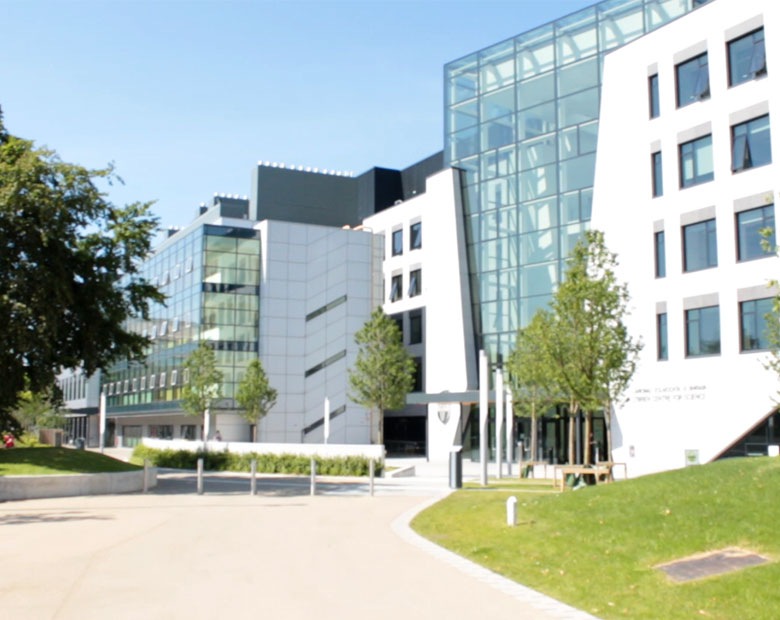
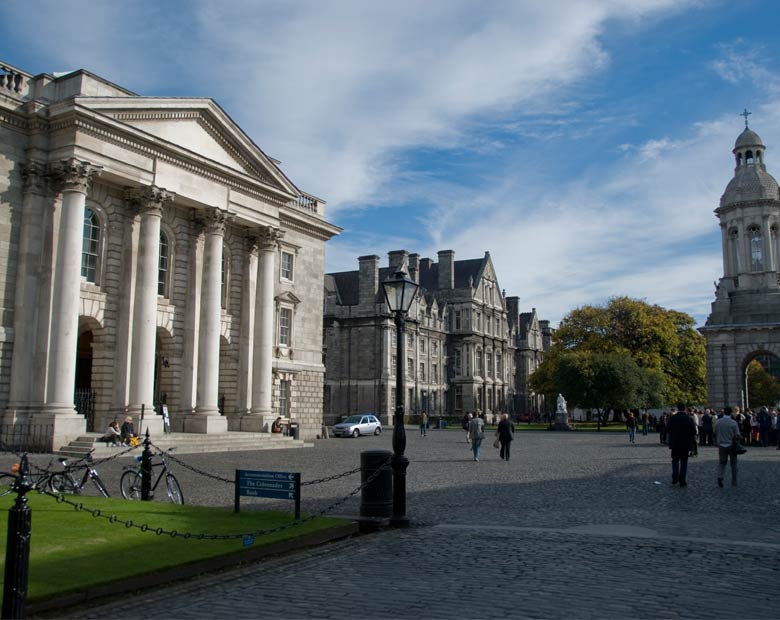
Trinity College Dublin (TCD)
Trinity College Dublin (TCD) is the highest ranking Irish University, and is ranked 98th in the world (QS World University Rankings 2023). Its main biomedical research themes are immunology/inflammation & infection, neuroscience, ageing and cancer – and the translational/clinical interfaces of these areas.
Trinity is a partner to some of the largest and most progressive hospitals in Ireland with co-localisation of clinical and research facilities. St. James’s Hospital, the largest in the state, contains on its campus, the Trinity Translational Medicine Institute (TTMI); the Centre for Advanced Medical Imaging (CAMI) with its 3T magnet; the Mercer’s Institute for Successful Aging (MISA); the Trinity St James’s Cancer Institute, and the Wellcome Trust/HRB Clinical Research Facility. The National Children’s Hospital, a €700M development, is under construction at the St. James’s campus and will contain a paediatric research building.
Life Sciences research at TCD is supported by three complementary Institutes: The Trinity Biomedical Sciences Institute, the Trinity Translational Medicine Institute and the Trinity College Institute of Neuroscience. These Institutes have interactive programmes of basic and applied research in which clinician scientists and basic scientists work closely together.
University of Galway
The University of Galway (UoG, formerly National University of Ireland Galway) was founded in 1845 and is The Sunday Times University of the Year 2022. University of Galway is a globally focused research-led university. We are working to improve health and wellbeing by addressing global challenges in medical technologies, regenerative medicine, population health & health services, neuroscience and cancer.
Our facilities include extensive laboratories and research capacity, including the Centre for Cell Manufacturing. University of Galway is the home of CÚRAM, the national SFI Centre for Research in Medical Devices, the National Centre for Biomedical Engineering Science (NCBES), Regenerative Medicine institute (REMEDI), the Network of Excellence for Functional Biomaterials, Centre for Chromosome Biology and the Centre for Pain Research. Our campus is adjacent to Galway University Hospital, where we have located our Lambe Institute for Translational Research and the Health Research Board (HRB) Clinical Research Facility. The Ryan Institute for Marine Science is one of the largest of its kind in Europe and houses the ERC-funded National Centre for One Health.
Age-related conditions, cancer, chronic diseases, infection, and mental health are the major health challenges facing our society and economy. At the College of Medicine, Nursing and Health Sciences our research aims to address these challenges. We have distinctive thematic research areas that are inter-linked and encompass basic discovery science, clinical/translational investigation and population/ societal health research.
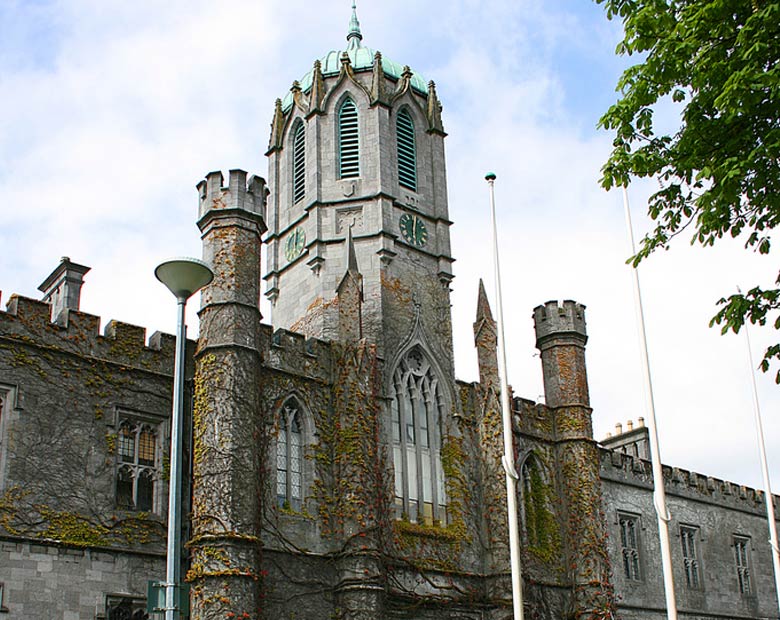
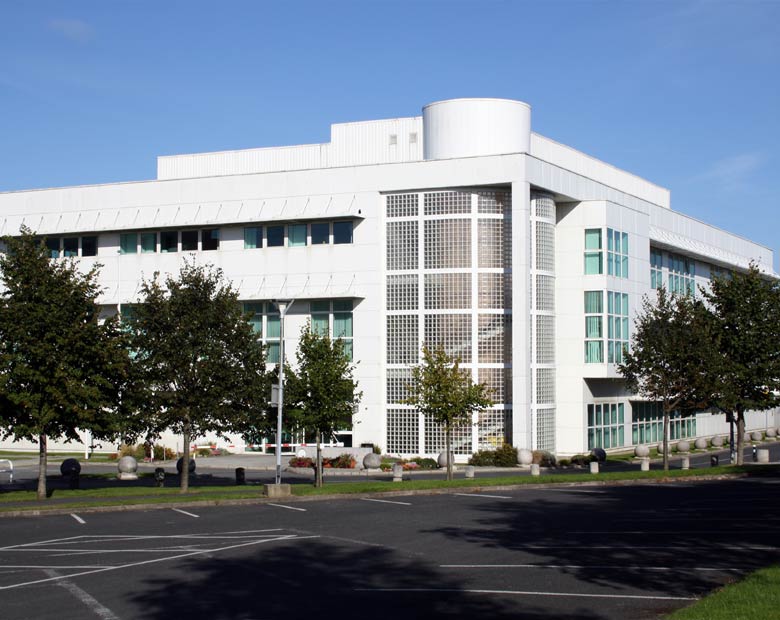
RCSI University of Medicine and Health Sciences (RCSI)
Royal College of Surgeons in Ireland (RCSI) has a strategic focus on clinical and patient-centred research. Key areas of research are Cancer; Population Health and Health Services, Neurological and Psychiatric Disorders, Biomaterials & Regenerative Medicine; Surgical Science and Practice; Vascular Biology.
The RCSI University of Medicine and Health Sciences is an independent, not-for-profit, health sciences institution focused on education and research with a distinctive international perspective. Originally founded in 1784 to support surgical training and practice, RCSI has grown to include undergraduate and postgraduate Schools and Faculties across the full spectrum of health sciences.
RCSI is Ireland’s largest medical school with almost 4,000 students representing over 60 nationalities and was ranked #201-250 in the 2020 Times Higher World University Rankings. It has a strong international presence with Schools in Malaysia and Dubai and a University in Bahrain. Its ultimate purpose is to work in the service of patients. Thus, RCSI promotes innovative research that leads to better diagnostics, therapeutics and devices, tackles important healthcare delivery issues, informs policy and clinical practice and enhances the quality of education of healthcare professionals.
University College Cork (UCC)
University College Cork (UCC), the Irish Times University of the Year 2016, was founded in 1845; it provides over 120 degree and professional programs, has over 23,000 students, and is ranked in the top 1.1% of Universities worldwide.
Comprising of six Schools, the College of Medicine and Health provides future medical and healthcare professionals with a world-class, student-centred education. UCC has a strong health and social wellbeing research portfolio and a wealth of interdisciplinary activity that links researchers throughout the university. Led by the APC Microbiome Ireland, the Irish Centre for Fetal and Neonatal Translational Research (INFANT), and other world-leading research units, key areas of focus include the human gut microbiome in health and disease, food and health, public health, perinatal health, gerontology and health services research.
Researchers at UCC also investigate the causes and prevention of obesity, cancer, cardiovascular disease, Type 2 diabetes, HIV and suicide, in addition to developing and applying technological solutions to the wide range of health and wellbeing challenges in modern society.
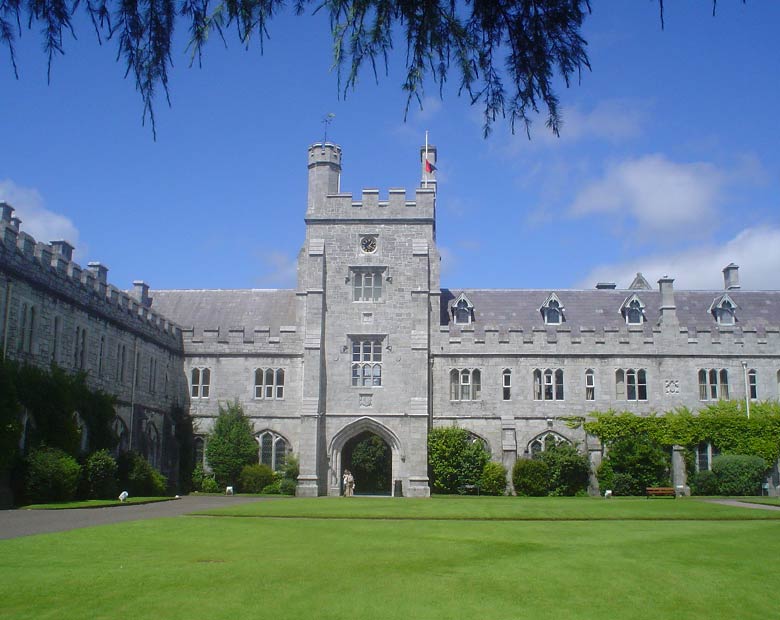

Queens University Belfast
Queen’s University Belfast (QUB) is a member of the Russell Group of leading UK research-intensive universities providing high quality education underpinned by world-class research.
QUB has invested in co-locating researchers to fully integrate basic science with translational and clinical research across several faculties on a single Health Sciences Campus. This has enabled a critical mass of clinical and scientific investigators working in a cross-school, multidisciplinary manner. Our four priority disease areas are respiratory, ophthalmology, diabetic vascular complications and cancer which have been chosen because they represent global and nationally-relevant health challenges and reflect our existing research strengths.
The clinical academic research infrastructure has been significantly enhanced by important investments e.g. the establishment of the Wellcome Trust-Wolfson Northern Ireland Clinical Research Facility (NICRF) in 2013 based at the Belfast City Hospital (adjacent to QUB medical school) and the Wellcome Trust-Wolfson Centre for Experimental Medicine. The clinical academic training programme is fully supported by both the Northern Ireland postgraduate deanery (NIMDTA) and the Belfast HSC Trust.
ICAT Partner Universities
Health and Social Care in Northern Ireland R&D Division
The Health and Social Care Research and Development (HSC R&D) Division is part of the Public Health Agency. Established in 2009, it is responsible for the administration and coordination of the HSC R&D budget on behalf of Department of Health, Northern Ireland (DoH NI). Its work is based on the principle that the best health and social care must be underpinned by knowledge, based on well conducted research, which can then be applied in the delivery of care. HSC R&D has partnered with NIMDTA to fund a number of ICAT fellowships for medical and dental trainees enrolled in training schemes in Northern Ireland.
Health Service Executive (HSE) National Doctors Training and Planning
National Doctors Training and Planning (NDTP) incorporates Medical Education and Training, Consultant Appointments and Medical Workforce Planning and was established in September 2014. This provides NDTP with a strategic overview of medical training from Internship through to appointment as a consultant. HSE-NDTP funds a number of ICAT fellowships for medical trainees in the Republic of Ireland, with a focus on trainees within specialties that are currently underserved in clinical academia in Ireland.
Northern Ireland Medical and Dental Training Agency
The Northern Ireland Medical and Dental Training Agency (NIMDTA) is responsible for funding, managing and supporting postgraduate medical and dental education within the Northern Ireland Deanery. It provides a range of services for those engaged in the delivery of postgraduate Medical and Dental education and training.
Forum of Irish Postgraduate Medical Training Bodies
The Forum was established in December 2006 with the aim of enhancing the effectiveness of the postgraduate training bodies in maintaining the highest standards in Medical Education and Training. The Forum facilitates discussion and best practice sharing and promotes common strategies across all postgraduate medical training bodies in Ireland.
College of Anaesthesiologists of Ireland
The College of Anaesthesiologists of Ireland exists to promote high quality practice in the fields of Anaesthesia, Intensive Care and Pain Medicine through its training, examinations and educational programmes. As a recognised Training Body, the College is responsible for setting training standards and for the organisation, supervision and counselling of doctors in training in Ireland. The College has partnered with the Health Research Board to fund two ICAT fellowships for trainees enrolled on its training schemes.
Department of Agriculture, Food and the Marine
The mission of the Department of Agriculture, Food and the Marine (DAFM) is to serve the government and people of Ireland by leading, developing and regulating the agri-food sector, protecting public health and optimising social, economic and environmental benefits. DAFM funds a number of ICAT fellowships for vets, and works with the UCD School of Veterinary Medicine to support the veterinary fellows.